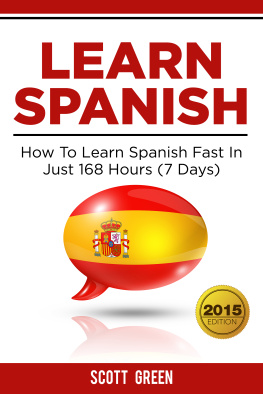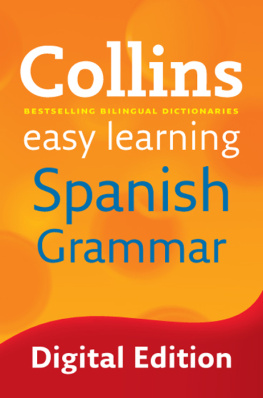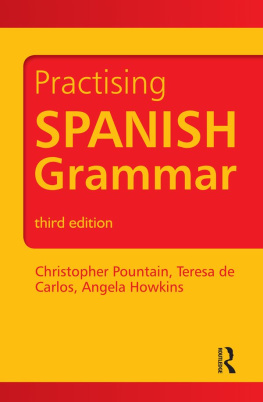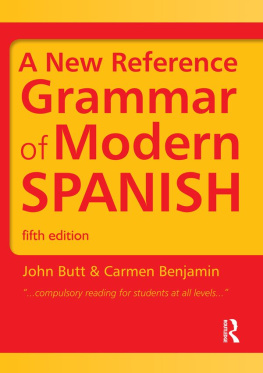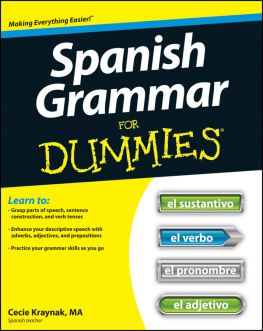LEARN SPANISH GRAMMAR FOR BEGINNERS:
Spanish Grammar Rules: Examples, Exceptions, Exercises, and Everything You Need to Master Proper Grammar & grow your vocabulary.
By
Mastery Language Learning
Copyright 2020 - All rights reserved.
The content contained within this book may not be reproduced, duplicated or transmitted without direct written permission from the author or the publisher.
Under no circumstances will any blame or legal responsibility be held against the publisher, or author, for any damages, reparation, or monetary loss due to the information contained within this book. Either directly or indirectly.
Legal Notice:
This book is copyright protected. This book is only for personal use. You cannot amend, distribute, sell, use, quote or paraphrase any part, or the content within this book, without the consent of the author or publisher.
Disclaimer Notice:
Please note the information contained within this document is for educational and entertainment purposes only. All effort has been executed to present accurate, up to date, and reliable, complete information. No warranties of any kind are declared or implied. Readers acknowledge that the author is not engaging in the rendering of legal, financial, medical or professional advice. The content within this book has been derived from various sources. Please consult a licensed professional before attempting any techniques outlined in this book.
By reading this document, the reader agrees that under no circumstances is the author responsible for any losses, direct or indirect, which are incurred as a result of the use of information contained within this document, including, but not limited to, errors, omissions, or inaccuracies.
Contents
Introduction
For most folks, learning a new language is one of the most challenging things they will ever do in their lives. The reason for this is that languages dont come easy. They take time and dedication for the learner to achieve a certain level of proficiency.
It takes several years of study and development before we can be reasonably proficient in a language. It is around the age of 7 or 8 when a child is able to communicate fairly well. Nevertheless, it takes a few more years of schooling and training before an individual truly masters a language. Even then, some folks are unable to go beyond a certain level of mastery.
The Advantage of Learning as an Adult
The big difference between learning a language as a child and learning a language as an adult lies in the fact that many of the cognitive processes, which children need to develop, have already been developed.
What does that mean?
It means that you dont need to go back and re-learn the alphabet or work on phonics. You can begin to reasonably decode a new language with some helpful pointers. Also, this means that you dont have to learn the mechanics of reading and writing. These are skills that you have already gotten a handle on in your native language.
So, what happens when you learn a new language is that you are transferring the skills you have already developed in your native language to the new language that you are learning. While that sounds rather straightforward, there are some bumps along the way.
First of all, language systems tend to vary significantly.
In general, languages function like complex systems that depend on logic. Every language has its own logic. However, that logic doesnt always make sense when compared to other languages. In fact, when you look at language, it is like getting a glimpse into the way the mind of people works.
Secondly, some languages share a common ancestry, while others have no relation between them, whatsoever. Most Indo-European languages share some kind of similarity among them. This can be observed in the syntax (word order) and the structure of words themselves. If this is the case, then it is a lot easier to make sense of the way such a language is structured.
Thirdly, some languages share a common base from which they splinter off into different directions. One such example is the so-called romance languages. These languages share a common ancestry in the Latin spoken by the old Roman Empire. That common base can be seen in the syntax and similarity in roots and word families. Yet, the similarities pretty much end there. Each language (Spanish, French, Italian, and so on) go off into their own direction, thus making them unique in their own right.
Main Differences between English and Spanish
So, what can you do to make learning a new language easier on you?
Based on the examples, the first aspect to consider is syntax. In the case of English and Spanish, they both share common syntax insofar as the subject preceding the verb. Then, the object of the verb follows right after the verb. This basic structure is essentially the same. However, there are some subtle differences. For instance, adjectives precede nouns in Spanish, whereas the opposite is true in English.
Also, romance languages make use of gender-specific nouns. This is one of the most significant differences between English and Spanish. For example, Spanish has a specific gender assigned to all nouns in the language. Now, determining the gender for each noun depends on its spelling. A general rule of thumb, in this case, is that o ending nouns are treated as masculine nouns, while the feminine nouns are identified with a ending nouns. This is a general rule of thumb, and there are a number of exceptions. Nevertheless, it is a good standard to rely on.
There is also a far more complex verb conjugation system in Spanish than in English. The most complex verb conjugations in English can be found with irregular verbs in the past tense and the past participle form. Beyond that, verb conjugation is fairly self-explanatory in English.
In Spanish, though, verb conjugations are dependent on verb tense and the verb ending of the verb in its infinitive form. This difference can make conjugating verbs seem hard. But once you become familiar with the patterns for each type of verb, you will find it to be much easier than you had initially anticipated.
These three main differences make English rather different from Spanish and are the source of frustration for many Spanish learners. In this guide, we will not only focus on these differences but also on other insider tips that will surely help you gain an advantage in your endeavors with the Spanish language.
Now, here are some general guidelines that you can follow when learning Spanish.
Listening practice is one of the most important exercises you can do on a regular basis. There are many audiovisual materials online. These materials will help you train your ear for the sound or the music of the Spanish language. In this case, you will not only hone your listening skills but also your pronunciation skills.
Vocabulary lists are old-fashioned but still hold their merits. Now, we are not advocating that you make long lists of words and pound them into your mind. What we are saying is keep a journal of the language you learn on a daily basis. This journal can be something as simple as writing down new words and expressions you learn. You can use drawings, pictures, and notes to help you imprint their meanings in your mind.
Grammar rules can be effective if that is something that you find useful. Not all people find grammar rules to be particularly useful and engaging. So, if you feel that writing out rules will help you fixate meaning in your mind, then, by all means, do so. If you dont feel too keen on memorizing rules, schematics, such as flowcharts and diagrams, can certainly help you gain a much different visual perspective.
The use of translation is alright at the beginning. While you will hear some teachers say that translation will actually harm your development, it is worth mentioning that translation can help you navigate through the meaning of words and grammar in the very early stages of your development. Translation can help you when you are traveling or interacting with other folks who may require your assistance.
Next page

